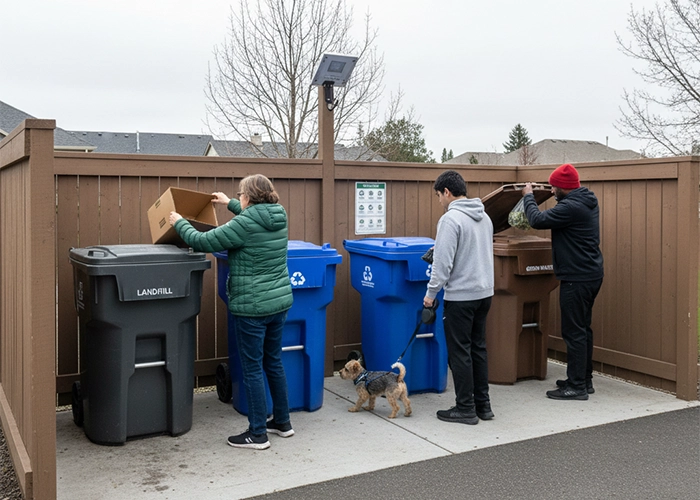What Are HOA Disputes? How To Practice Dispute Resolution?

Homeowners association disputes are very common. Given the diversity within a community, there’s no guarantee that the members will get along with each other all the time. Nevertheless, HOA board members need to have an effective strategy for dealing with neighbor disputes. Here’s what you need to know about resolving HOA disputes fairly.
Browse By Category
Sign up for Our Newsletter
Homeowners association disputes are very common. Given the diversity within a community, there’s no guarantee that the members will get along with each other all the time. Nevertheless, HOA board members need to have an effective strategy for dealing with neighbor disputes. Here’s what you need to know about resolving HOA disputes fairly.
HOA Disputes: Should the HOA Intervene Between Neighbors?
When there is a dispute between neighbors, should the HOA have to intervene? This is a question that many HOA boards ask themselves. The answer? It depends. Boards will have to investigate HOA disputes between neighbors on a case-by-case basis and then determine whether to intervene or not.
If HOA disputes are of a personal nature — e.g., the conflict has to do with dating or relationships — the board should not really intervene. The board must always maintain neutrality and interfering with personal matters might suggest that they are taking sides.
Meanwhile, if the homeowners association problems involve the community’s governing documents, the board may have no choice but to intervene between neighbors. For example, if a homeowner complains about their neighbor always playing loud music late at night, this is considered a noise-related complaint. Most associations’ bylaws would have fines and sanctions for that.
Here are some of the most common causes of HOA disputes between neighbors:
- Noise complaints (loud parties or sound from TV, music, or instruments)
- Excessive barking from pets
- Unruly behavior from children
- Visual nuisances (overhanging trees, overgrown lawns, overflowing trash cans)
- Property maintenance issues
- Strong or unpleasant odors (cooking, smoking, etc.)
- Illegal or disruptive behaviors
If you have bad neighbors, and they are clearly violating the HOA’s rules and regulations, the board should rightfully intervene. Also, board members must also consider intervening between neighbors with personal disputes when their issue starts to affect the other members of the community. Failure to intervene in neighbor disputes where there is a threat to the safety and well-being of the community may lead to liabilities for the HOA.
Internal Process for Homeowner Association Disputes
If disputes between neighbors are not resolved quickly, it can escalate and cause major problems for everyone involved — including the HOA. The police could become involved in cases of physical violence, and this can lead to costly lawsuits.
Even though the board isn’t directly involved in these HOA disputes, it’s still their responsibility to maintain peace and order in the community. As such, it’s important to have an HOA dispute resolution policy.
A standard process for homeowners association dispute resolution ensures that the board can deal with cases fairly and judiciously. An effective dispute resolution process is also an essential part of any successful HOA.
So, how do you handle an HOA dispute? While dispute resolution will vary for each association, here is a general summary of the process.
1. Homeowner Complaint or Request for Dispute Resolution
The HOA conflict resolution process will begin with a homeowner’s complaint or request for HOA intervention. A written request usually triggers the process. But, if the complaint was made verbally, the HOA board or management should document it.
If not already in place, your board should consider requiring homeowners to submit HOA complaints in writing. This formalizes the procedure and ensures the existence of a paper trail. If you can, it would be much better to standardize the complaint letter by providing homeowners with a template or form.
Here is a sample complaint letter to HOA about neighbor problems:

Download Your FREE HOAM Dispute Resolution Letter Here
2. Gather Sufficient Information
If the association does not have an HOA manager or management company, the board should assign a person in charge. This person will be the one to investigate the complaint. Gather as much information as you can regarding the HOA dispute. This should be done in a timely manner so that the issue can also be resolved quickly.
This step is crucial and remains one of the HOA’s responsibilities in neighbor disputes. Collecting information is usually easier with an HOA manager or management company, though. They can also filter through and sort the complaints ahead of time for the board.
3. Board Decision to Intervene
During a board meeting, the appointed member will present all the information they gathered. The board will then decide whether the neighbor dispute requires HOA intervention.
If possible, have HOA management or legal counsel present so that they can provide valuable insights.
The board will write a written notice of the decision. For instance, if a homeowner is found to have violated the bylaws, the board will send an official notice. This may include fines or restrictions of privileges depending on your governing documents.
4. HOA Negotiation

If HOA disputes continue, the board may decide to meet with the neighbors. This initial meeting will give both sides of the dispute the opportunity to voice their concerns and explain any remedies that are being sought.
The HOA should act as a neutral mediator in this setting. The goal is to resolve the dispute between neighbors in an objective manner. If they are able to come to an agreement, the board will put this into writing and have the neighbors sign the written document.
How to Deal With Disputes Between the HOA and Residents
Apart from neighbor-to-neighbor disputes, it’s also possible to have disputes between homeowners and the board (or board members). When dealing with such disputes, it’s important to ask yourself whether the dispute is even serious. Sometimes, board members can get carried away by their emotions, resulting in petty or spiteful disputes.
Remember that board members have a fiduciary duty to prioritize the association’s interests. As such, you should always treat every case consistently and without bias.
Some of the most common causes of HOA disputes of this nature include but are not limited to:
- Disagreement about violations the homeowner is accused of committing
- Fines imposed on homeowners
- Differing interpretations of rules and covenants
- Imposing a rule not recorded within the governing documents
- Disagreement about the HOA’s authority to enforce rules
- Inconsistent or selective enforcement (or the perception of it)
- Disagreement about fund management or budgetary issues
- Imposing special assessments or an increase in dues
In any case, the HOA should still start its standard dispute resolution process. However, to maintain fairness and objectivity, the board should not be in charge. You can appoint a third party to resolve these homeowner association disputes. This can be your HOA management company or your HOA attorney.
Apart from being qualified to handle HOA disputes, the third party must be neutral. They must be able to present a resolution that takes into consideration both sides. The third part will put the resolution into writing at the conclusion of the meeting.
Can You Sue Over HOA Disputes?
In a word, yes. Homeowners can sue the HOA over disputes, but the litigation process is a long, tiring, and usually expensive one. There are some exceptions to this, though. State laws and an association’s governing documents may require parties to go through mediation or arbitration first, saving litigation as the last resort.
Alternative Forms of HOA Dispute Resolution
If HOA disputes cannot be resolved internally, you may need to consider alternative dispute resolution methods such as mediation and arbitration. Both of these options allow homeowners to resolve their conflicts without litigation. These will have added costs, but they are considered less costly than lawsuits.
Meanwhile, extreme cases of HOA disputes may also lead to lawsuits. This will require even more time and money. However, if the dispute involves neighbors, this may be out of the HOA’s hands.
HOA Mediation
During mediation, a trained mediator will step in to help the parties involved reach a resolution. The mediator will listen to all parties with the goal of coming to a compromise or finding a middle ground.
Keep in mind that mediation is in no way mandatory. That means no one can force the HOA or the homeowner to participate in one. Of course, hiring a third-party neutral will cost money, and the entire mediation process does take time. Still, it is a much better (and cheaper) option than taking the matter to court.
Many states have associations of mediators or a list of government-approved mediators that HOAs employ.
HOA Arbitration
During the arbitration, a neutral third-party will hear out all parties and examine the evidence. This differs from mediation in that the arbitrator will ultimately make the final decision on how the dispute should be resolved. Like mediation, this process takes both time and money. Additionally, the parties may not be happy with the ultimate decision the arbitrator makes.
Alternative Dispute Resolution Per State
Homeowners who wish to find a mediator can use this website to look for one according to their location and area of practice. For arbitrators, homeowners can file a case here. Apart from mediation and arbitration, homeowners can also file a complaint with a state agency.
Alabama
In Alabama, homeowners and HOAs can seek help from the Alabama Center for Dispute Resolution. Homeowners can also find mediators and arbitrators through the American Arbitration Association and the Alabama Academy of Mediators & Arbitrators. Consumers may also file a complaint with the Alabama Attorney General’s Office, though it is unclear whether the office handles HOA issues.
Alaska
Homeowners in Alaska can find a mediator or arbitration through the American Arbitration Association. Alaska currently doesn’t regulate homeowners associations. Consumers may also file a complaint with the Alaska Attorney General’s Office, though it is unclear whether the office handles HOA issues.
Arizona
Since 2016, the Arizona Department of Real Estate has been handling HOA disputes. Homeowners can petition the department for a hearing by filling out this form. Homeowners may also find mediators and arbitrators through the American Arbitration Association and the Arizona Academy of Mediators & Arbitrators.
Arkansas
Homeowners in Arkansas can find a mediator or arbitration through the American Arbitration Association and the Arkansas Academy of Mediators & Arbitrators. Consumers may also file a complaint with the Arkansas Attorney General’s Office, though it is unclear whether the office handles HOA issues.
California
Homeowners can turn to the Office of the Attorney General for select HOA-related complaints. For mediators and arbitrators, homeowners can refer to the American Arbitration Association or the California Academy of Distinguished Neutrals.
Colorado
In Colorado, the Department of Regulatory Agencies regulates homeowners associations. Homeowners can file a complaint through the department’s website. Alternatively, homeowners can look for mediators through the American Arbitration Association, the Mediation Association of Colorado, the Colorado Bar Association, the Colorado Academy of Mediators & Arbitrators, or the Office of Dispute Resolution.
Connecticut
Homeowners in Connecticut can find a mediator or arbitration through the American Arbitration Association or the Connecticut Academy of Mediators & Arbitrators. Consumers may also file a complaint with the Connecticut Attorney General’s Office, though it is unclear whether the office handles HOA issues.
Delaware
In Delaware, homeowners can turn to the Office of the Ombudsperson for the Common Interest Community for help in resolving disputes. The division works under the Department of Justice. Homeowners can also look for third-party neutrals through the American Arbitration Association or the Delaware Academy of Mediators & Arbitrators.
Florida
Homeowners in Florida can file a complaint with the Office of the Attorney General or the Department of Business & Professional Regulation. For condominiums, you can file a complaint with the Office of the Condominium Ombudsman. Here is a copy of their comprehensive instructions for filing a complaint against condominium associations or managers. You may also call or e-mail your questions concerning your condominium to the Ombudsman at ombudsman@myfloridalicense.com.
To find a mediator, homeowners can go to the Florida Dispute Resolution Center, the Florida Circuit-Civil Mediator Society, the American Arbitration Association, or the Florida Academy of Professional Mediators.
Georgia
In Georgia, homeowners can seek help from the Office of Dispute Resolution. Homeowners can also look for third-party neutrals through the American Arbitration Association or the Georgia Academy of Mediators & Arbitrators.
Hawaii
Homeowners in Hawaii can find a mediator or arbitration through the American Arbitration Association, the Mediation Center of the Pacific, West Hawaii Mediation Center, or the Ku’ikahi Mediation Center. For complaints, consumers can refer to the Regulated Industries Complaints Office, though it is unclear whether the office handles HOA issues.
Idaho
Homeowners in Idaho can find a mediator or arbitration through the American Arbitration Association or the Idaho Academy of Mediators & Arbitrators. Consumers may also file a complaint with the Idaho Attorney General’s Office, though it is unclear whether the office handles HOA issues.
Illinois
In Illinois, homeowners can seek mediation services from the Center for Conflict Resolution. Homeowners can also look for third-party neutrals through the American Arbitration Association or the Illinois Academy of Mediators & Arbitrators. They may also lodge a complaint with the Department of Financial & Professional Regulation.
Indiana
Consumers may also file a complaint with the Indiana Attorney General’s Office, though a transaction must have taken place before the office can start investigations. It is unclear whether the office handles HOA issues. They may also look for mediators or arbitration through the Indiana Judicial Branch’s mediator search, the American Arbitration Association, or the Indiana Academy of Mediators & Arbitrators.
Iowa
Consumers may also file a complaint with the Iowa Attorney General’s Office, though it is unclear whether the office handles HOA issues. It is a good idea to attach supporting documents to the complaint, such as correspondence, proofs of payments, etc. They may also find mediators and arbitrators through the Iowa Academy of Mediators & Arbitrators or the American Arbitration Association.
Kansas
Homeowners looking for a mediator can check the Kansas Judicial Branch’s website, the American Arbitration Association, or the Kansas Academy of Mediators & Arbitrators. The state government also provides a list of mediators per area. There’s also the option of filing specific types of complaints with the Attorney General’s Office.
Kentucky
In Kentucky, Homeowners can find mediators and arbitrators through the Kentucky Academy of Mediators & Arbitrators or the American Arbitration Association. Consumers may also file a complaint with the Kentucky Attorney General’s Office, though it is unclear whether the office handles HOA issues.
Louisiana
Homeowners in Louisiana can look for mediators and arbitrators through the Louisiana State Bar Association directory, the American Arbitration Association, or the Louisiana Academy of Mediators & Arbitrators. Additionally, consumers can also file a complaint with the Office of the Attorney General, though it is unclear whether the office handles HOA issues.
Maine
Homeowners can find mediators and arbitrators through the Maine Association of Mediators, the American Arbitration Association, and the Maine Academy of Mediators & Arbitrators. The state’s Judicial Branch also maintains an Alternative Dispute Resolution program. Moreover, consumers can also file a complaint with the Office of the Attorney General, though it is unclear whether the office handles HOA issues.
Maryland
Consumers can file a complaint with the Office of the Attorney General, though it is unclear whether the office handles HOA issues. The state’s Mediation and Conflict Resolution Office also provides helpful information, including an online directory of mediators. Homeowners can also look for third-party neutrals through the American Arbitration Association or the Maryland Academy of Mediators & Arbitrators.
Maryland is special in that two counties also have their own offices regulating homeowners associations:
Massachusetts
Homeowners can find mediators and arbitrators through the American Arbitration Association or the Massachusetts Academy of Mediators & Arbitrators. The Commonwealth of Massachusetts also provides information on ADR, including approved ADR programs. Additionally, consumers can file a complaint with the Office of the Attorney General, though it is unclear whether the office handles HOA issues.
Michigan
Homeowners in Michigan can go through the Office of Dispute Resolution to find mediators. The American Arbitration Association and the Michigan Academy of Mediators & Arbitrators also provide a list of mediators and arbitrators in the state. In addition to this, consumers may also lodge a complaint with the Department of the Attorney General, though it is unclear whether the office handles HOA issues.
Minnesota
The Minnesota Judicial Branch handles alternative dispute resolution. Apart from that, homeowners can look for mediators and arbitrators through the American Arbitration Association or the Minnesota Academy of Mediators & Arbitrators.
Mississippi
Homeowners can find mediators and arbitrators through the American Arbitration Association or the Mississippi Academy of Mediators & Arbitrators. The Mississippi Bar also maintains a directory of mediators.
Missouri
Homeowners can look for mediators and arbitrators through the American Arbitration Association, the Association of Missouri Mediators, or the Missouri Academy of Mediators & Arbitrators. Additionally, consumers can file a complaint with the Missouri Attorney General, though it is unclear whether the office handles HOA issues.
Montana
Homeowners can find mediators and arbitrators through the American Arbitration Association or the Montana Academy of Mediators & Arbitrators. Moreover, homeowners can lodge a complaint with the Office of Consumer Protection, though it is unclear whether the office handles HOA issues.
Nebraska
For complaints, homeowners can turn to the Attorney General’s Office, though it is unclear whether the office handles HOA issues. Homeowners can also find approved mediators on the Nebraska Judicial Branch website, the American Arbitration Association, or the Nebraska Mediation Association.
Nevada
The Nevada Real Estate Division provides an alternative dispute resolution program. Homeowners can also find mediators and arbitrators through the American Arbitration Association or the Nevada Academy of Mediators & Arbitrators. Finally, homeowners can file complaints with the Office of the Ombudsman for Common-Interest Communities.
New Hampshire
In New Hampshire, consumers can lodge a complaint with the Consumer Protection Bureau, though it is unclear whether the office handles HOA issues. Homeowners looking for alternative dispute resolution may also find mediators and arbitrators through the American Arbitration Association or the New Hampshire Academy of Mediators & Arbitrators.
New Jersey
In New Jersey, homeowners can look for third-party neutrals through the American Arbitration Association, the New Jersey Academy of Mediators & Arbitrators, and the District of New Jersey’s certified mediator list.
New Mexico
In New Mexico, homeowners can look for mediators through the American Arbitration Association and the New Mexico Academy of Mediators & Arbitrators. Consumers can also lodge a complaint with the New Mexico Attorney General, though it is unclear whether the office handles HOA issues.
New York
Homeowners in New York can look for mediators through the American Arbitration Association, the New York Academy of Mediators & Arbitrators, or the New York Courts.
The New York Attorney General can also help homeowners with some problems concerning their HOAs. However, the Attorney General’s Office will not pursue an investigation into an HOA’s breaches of the law unless homeowners submit substantial evidence. Simple, baseless reports will not be accepted.
North Carolina
In North Carolina, consumers can file a complaint with the Office of the Attorney General, though it is unclear whether the office handles HOA issues. Additionally, homeowners can look for third-party neutrals through the Dispute Resolution Commission, the American Arbitration Association, or the North Carolina Academy of Superior Court Mediators.
North Dakota
In North Dakota, homeowners can look for mediators through the American Arbitration Association. The North Dakota Courts also provide information on alternative dispute resolution, including a roster of third-party neutrals.
Ohio
The Supreme Court of Ohio provides information and assistance with dispute resolution. Homeowners can also look for mediators through the American Arbitration Association or the Ohio Academy of Mediators & Arbitrators.
Oklahoma
In Oklahoma, homeowners can lodge a complaint with the Oklahoma Attorney General, though it is unclear whether the office handles HOA issues.. They can also find third-party neutrals through the American Arbitration Association or the Oklahoma Academy of Mediators & Arbitrators.
Oregon
Oregon homeowners can seek mediators and third-party neutrals through the American Arbitration Association or the Oregon Academy of Mediators & Arbitrators.
Pennsylvania
In Pennsylvania, homeowners can look for third-party neutrals through the American Arbitration Association, the Pennsylvania Academy of Mediators & Arbitrators, or the Pennsylvania Council of Mediators. Moreover, consumers may also file a complaint with the Attorney General’s Office, though it is unclear whether the office handles HOA issues.
Rhode Island
Consumers in Rhode Island can file a complaint with the Office of the Attorney General, though it is unclear whether the office handles HOA issues. In addition to this, homeowners can also search for mediators through the Rhode Island Mediators Association or the American Arbitration Association.
South Carolina
In South Carolina, homeowners can find mediators through the American Arbitration Association or the South Carolina Academy of Mediators & Arbitrators. Consumers can also file a complaint with the Department of Consumer Affairs, though it is unclear whether the office handles HOA issues.
South Dakota
Homeowners in South Dakota can look for mediators through the American Arbitration Association. Consumers can also file complaints with the Office of the Attorney General, though it is unclear whether the office handles HOA issues.
Tennessee
In Tennessee, consumers can lodge a complaint with the Attorney General & Reporter, though it is unclear whether the office handles HOA issues. Homeowners can also find third-party neutrals through the American Arbitration Association, the Tennessee Academy of Mediators & Arbitrators, or the Tennessee State Courts directory.
Texas
Consumers in Texas can file a complaint with the Attorney General under the Consumer Protection Division, though it is unclear whether the office handles HOA issues. Additionally, homeowners can look for mediators through the American Arbitration Association, the Texas Academy of Distinguished Neutrals, or the Texas Association of Mediators.
Utah
For those looking for mediators, the American Arbitration Association, the Utah Academy of Mediators & Arbitrators, and the Utah Courts provide a directory of third-party neutrals. Moreover, consumers can lodge a complaint with the Office of the Attorney General, though it is unclear whether the office handles HOA issues.
Vermont
In Vermont, homeowners can find mediators and arbitrators through the American Arbitration Association or the Vermont Academy of Mediators & Arbitrators. They may also file a complaint with the Office of the Vermont Attorney General, though it is unclear whether the office handles HOA issues.
Virginia
In Virginia, homeowners associations are regulated by the Office of the Common Interest Community Ombudsman. Homeowners can file a complaint through this office for any concerns with their HOA. Additionally, homeowners can look for third-party neutrals through the American Arbitration Association or Virginia’s Judicial System.
Washington
Homeowners in Washington can find mediators and arbitrators through the American Arbitration Association, the Washington Mediation Association, or the Washington Academy of Mediators & Arbitrators. Moreover, consumers can also file a complaint with the Office of the Attorney General, though it is unclear whether the office handles HOA issues.
West Virginia
In West Virginia, the American Arbitration Association, the West Virginia Academy of Mediators & Arbitrators, and the West Virginia State Bar maintain a directory of third-party neutrals. Furthermore, consumers can file a complaint with the Office of the WV Attorney General, though it is unclear whether the office handles HOA issues.
Wisconsin
Homeowners in Wisconsin can look for mediators and arbitrators through the American Arbitration Association or the Wisconsin Academy of Mediators & Arbitrators. Additionally, consumers can lodge a complaint with the Wisconsin Department of Justice, though it is unclear whether the office handles HOA issues.
Wyoming
In Wyoming, homeowners can find third-party neutrals through the American Arbitration Association.
Resolve Homeowner Association Disputes Fairly and Judiciously
 A successful homeowners association is one that maintains positive relationships between homeowners, as well as between homeowners and the board. Your ability to resolve HOA disputes will depend on the association’s timely response.
A successful homeowners association is one that maintains positive relationships between homeowners, as well as between homeowners and the board. Your ability to resolve HOA disputes will depend on the association’s timely response.
It is also important to have a clear dispute resolution policy. Being fair and judicious throughout the process communicates to homeowners that the HOA cares for the wellbeing of all its members.
RELATED ARTICLES:
- Can Homeowners Sue HOA Board Members Or The Condo Board?
- HOA Attorneys – Why They Are Important And How To Find One
- A Risk Management For HOA Guide
Trending Now
Related Article
Sign up for Our Monthly Newsletter
Sign up below for monthly updates on all HOA Resource















